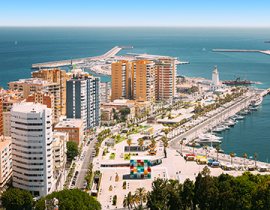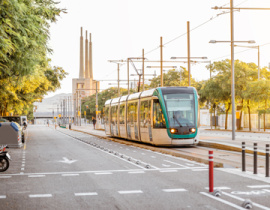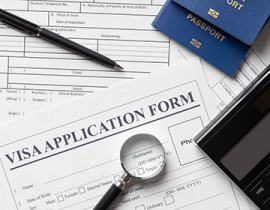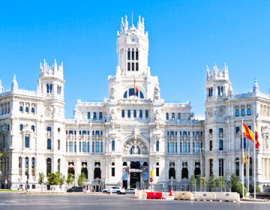Your Guide to Barcelona’s International Education System
Barcelona, the capital of Catalonia, is a city that blends the old with the new, tradition with innovation. Known for its breathtaking architecture, vibrant cultural scene, and Mediterranean lifestyle, Barcelona is also a hub for international education, attracting families around the world who seek a top-tier education for their children.
Choosing the right school in Barcelona is crucial for expatriate families, as it directly influences their children’s adaptation to a new environment and their future academic success.
Education System in Barcelona
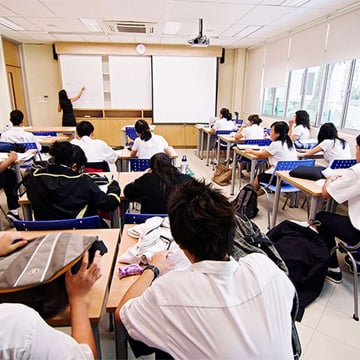 Barcelona education system is well-developed and offers a variety of options to cater to different educational needs and preferences. Education typically begins at the age of 6 and is compulsory until the age of 16. However, before the age of 6, parents can enroll their children in nursery schools or preschools, starting as early as 3 years old.
Barcelona education system is well-developed and offers a variety of options to cater to different educational needs and preferences. Education typically begins at the age of 6 and is compulsory until the age of 16. However, before the age of 6, parents can enroll their children in nursery schools or preschools, starting as early as 3 years old.
Education in Barcelona is compulsory for all children aged 6 to 16. The first stage is Primary Education (Educación Primaria), which covers ages 6 to 12. This is followed by Compulsory Secondary Education (Educació Secundària Obligatòria or ESO), for students ages 12 to 16. Upon completing secondary education, students can either continue their studies at the pre-university level or enter vocational training.
The Pre-University Level, known as Bachillerato, is a two-year program following ESO. It prepares students for university entrance exams, known as Selectividad or EBAU, and for higher education.
Vocational Training: Referred to as Formación Profesional (FP), vocational training offers practical education in various trades and professions. It is divided into three levels.
Basic Vocational Training(Ciclo de Formación Profesional Básica): Aimed at students aged 15 and above who have not completed ESO, providing vocational skills.
Intermediate Vocational Training: (Ciclo Formativo de Grado Medio): For students who have completed compulsory secondary education, offering more specialised training and leading to a technical diploma.
Advanced Vocational Training: (Ciclo Formativo de Grado Superior): For students who have completed the Baccalaureate or Intermediate Vocational training, providing advanced training in a specific field and leading a higher technical diploma.
You can read our article about the education system and schools in Spain on our blog page to get information about education stages and student visas.
Comparison of Public Private and International Schools in Barcelona
Barcelona offers three main types of schools: public, private, and international. Each type of school provides a distinct approach to education:
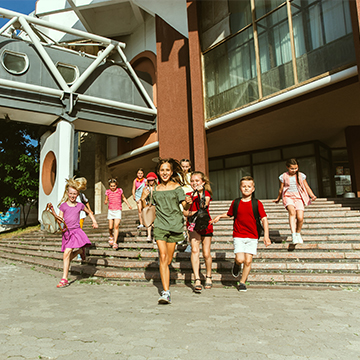 Public Schools: Public schools in Barcelona are funded by the government and are free for all children, including expatriates. These schools follow the Catalan-Spanish curriculum, which emphasizes core subjects such as mathematics, science, language, and social studies, strongly focusing on the Catalan language and culture. The primary language of instruction is Catalan, while Spanish is also widely used. English instruction may vary from school to school. Public schools are well-integrated into the community, making them an excellent choice for families looking to immerse their children in local culture and language. While public schools do not charge tuition fees, parents may need to cover the costs of materials, uniforms, and extracurricular activities. Notable public schools in Barcelona include Instituto Público Jaume Balmes, Escola Virolai, Instituto Pedralbes, Escola Ramon Llull, and Institut Joan d’Austria.
Public Schools: Public schools in Barcelona are funded by the government and are free for all children, including expatriates. These schools follow the Catalan-Spanish curriculum, which emphasizes core subjects such as mathematics, science, language, and social studies, strongly focusing on the Catalan language and culture. The primary language of instruction is Catalan, while Spanish is also widely used. English instruction may vary from school to school. Public schools are well-integrated into the community, making them an excellent choice for families looking to immerse their children in local culture and language. While public schools do not charge tuition fees, parents may need to cover the costs of materials, uniforms, and extracurricular activities. Notable public schools in Barcelona include Instituto Público Jaume Balmes, Escola Virolai, Instituto Pedralbes, Escola Ramon Llull, and Institut Joan d’Austria.
Private Schools: Private schools in Barcelona offer a more flexible approach to education. Some are fully independent, while others are semi-private (concertados), which receive partial government funding and therefore offer a more affordable option compared to fully private institutions. The Catalan-Spanish curriculum is commonly followed in these schools but with added flexibility in contents and teaching methods. The language of instruction in private schools varies, with some offering programs in Catalan, Spanish, English, or German. Additionally, many private schools provide trilingual programs, enhancing students’ fluency in multiple languages. Tuition fees can be significant, though semi-private schools tend to be more budget-friendly. These schools also offer extensive language immersion and bilingual programs, catering to the diverse needs of their student body. Some of the top private in Barcelona include Escuela Pia de Sarriá, La Salle Bonanova, Viaro Global School, Jesuitas de Sarriá San Ignacio, and Liceu Politècnic.
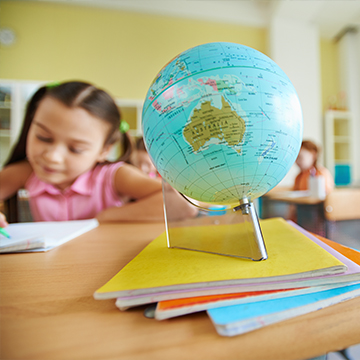 International Schools: International schools in Barcelona are particularly popular among expatriate families. These schools offer a range of international curricula, including British, American, French, and International Baccalaureate (IB) programs. With a focus on preparing students for higher education worldwide, international schools emphasize academic excellence and cultural diversity. English is typically the primary language of instruction, although many schools also offer classes in other languages such as French, German, Japanese, and Spanish. International schools are known for their high tuition fees, reflecting their advanced facilities, small class sizes, and extensive extracurricular programs. They also offer robust language programs and often include bilingual or multilingual education, preparing students for a globalized world. Noteworthy international schools in Barcelona include Agora Barcelona International School, Aula Escola Europea, Col·legi Montserrat, Hamelin-Laie International School, and AgoraSant Cugat International School.
International Schools: International schools in Barcelona are particularly popular among expatriate families. These schools offer a range of international curricula, including British, American, French, and International Baccalaureate (IB) programs. With a focus on preparing students for higher education worldwide, international schools emphasize academic excellence and cultural diversity. English is typically the primary language of instruction, although many schools also offer classes in other languages such as French, German, Japanese, and Spanish. International schools are known for their high tuition fees, reflecting their advanced facilities, small class sizes, and extensive extracurricular programs. They also offer robust language programs and often include bilingual or multilingual education, preparing students for a globalized world. Noteworthy international schools in Barcelona include Agora Barcelona International School, Aula Escola Europea, Col·legi Montserrat, Hamelin-Laie International School, and AgoraSant Cugat International School.
Types of International Schools
British Schools: British international schools in Barcelona offer a balanced trilingual education, following the National Curriculum of England and Wales. This curriculum provides a solid foundation in various subjects, leading to IGCSEs and A-Levels. Graduates are well-prepared for higher education, particularly in the UK but also at prestigious universities worldwide. Key British schools include Highlands School Barcelona, Kensington School, and Oak House School.
American Schools: American schools in Barcelona provide education from age 3 to 18, following the American curriculum. This system prepares students for the SATs and college admissions, with many graduates gaining acceptance into prestigious universities and securing scholarships. Notable American schools are the American School of Barcelona, Gresol International American School, and Benjamin Franklin International School (BFIS), which is recognized for its strong academic program and global acceptance.
French Schools: French international schools adhere to the French education system, approved by the French Ministry of Education. These schools prepare students for international exams such as TOEFL and Oxford. Key French schools in Barcelona include École Française Ferdinand de Lesseps, Lycée Français Bel Air, and Lycée Français de Barcelone.
A majority of high schools in Barcelona offer extensive language programs, with additional support available from international language schools to further enrich students’ linguistic abilities.
Other International Schools
- St. Peter’s School: St. Peter’s School is an IB World School that delivers the International Baccalaureate (IB) curriculum at all educational levels. As the first international school in Barcelona to adopt English as the primary language of instruction, it maintains a higher percentage of English-taught classes compared to other schools in the region. Recognized as the top school in Spain by Forbes magazine, St. Peter’s stands out for its commitment to academic excellence. It is also the only school in Catalonia to offer a dedicated science laboratory for children as young as 0 to 6 years old. With a full IB Continuum in English from ages 3 to 18, the school provides a globally focused education that fosters critical thinking and innovation.
 Colegio Hatikva: This school integrates Jewish educational traditions into its curriculum, emphasizing values and cultural heritage alongside academic instruction.
Colegio Hatikva: This school integrates Jewish educational traditions into its curriculum, emphasizing values and cultural heritage alongside academic instruction.- Colegio Japonés de Barcelona: This school follows the Japanese curriculum and delivers a comprehensive Japanese education using the Shogaku (elementary, for children aged 7 to 12) and Chugaku (middle school, for children aged 12 to 15) systems.
- Deutsche Schule Barcelona: This school offers a German curriculum, prepares students for the Abitur, and provides bilingual instruction in German and Spanish.
- Scuola Italiana di Barcellona: Instruction is primarily in Italian, following the Italian education system and preparing students for higher education in Italy.
Each type of international school in Barcelona offers unique curricula and educational philosophies, allowing expatriate families to choose the best fit for their children’s academic and cultural needs.
Besides, for expatriate families looking for a Spanish school in Barcelona, numerous options offer a range of curricula to suit different educational needs and preferences.
Higher Education in Barcelona
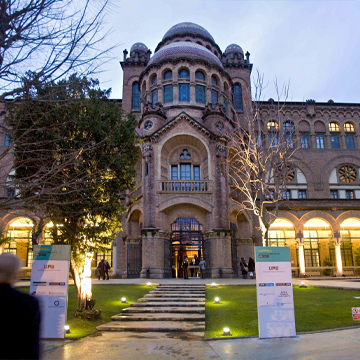 Barcelona is a highly preferred city for university students. The city’s educational landscape is diverse, with numerous options for those seeking quality higher education.
Barcelona is a highly preferred city for university students. The city’s educational landscape is diverse, with numerous options for those seeking quality higher education.
As one of the oldest and most prestigious universities in Barcelona, the University of Barcelona provides a comprehensive range of undergraduate and graduate programs across various disciplines. Known for its research excellence and international collaborations. For information on how to apply to the University of Barcelona, students should visit the university’s official website or contact their admissions office directly.
Part of the University of Navarra, IESE Business School Barcelona is a leading institution for business education in Europe. It offers MBA programs, executive education, and specialized courses with a global focus.
The Polytechnic University of Catalonia, Barcelona is well-regarded for its programs in engineering, architecture, and technology. It provides cutting-edge education and research opportunities, making it a key institution for students in technical and scientific fields.
Affiliated with the University of Pompeu Fabra, the Barcelona School of Management (BSM) provides specialized programs in management, finance, and innovation, catering to both local and international students.
These institutions represent just a few of the many opportunities available for higher education in Barcelona, each offering unique programs to accommodate a wide range of academic and professional interests.
Admission Process for International Schools
 The admissions process for international schools in Barcelona Spain can be competitive and may vary depending on the school. Generally, the process includes:
The admissions process for international schools in Barcelona Spain can be competitive and may vary depending on the school. Generally, the process includes:
1. The first step is to complete an online application form, which is typically found on the school’s website. This form will require detailed information about the student.
2. Along with the online application, you will need to submit several documents:
- Academic records such as transcripts or report card
- Letters from current teachers or school counselors
- Passports of the students and parents
3. An application fee is required when submitting your application. The fee typically ranges between 200-250 euros, depending on the school.
4. Once the application is submitted, the student may be required to undergo an assessment. This could be a language proficiency exam or a general academic test designed to evaluate the student’s level in core subjects.
5. After all the documents and assessments are completed, the school committee will review the application. If the student qualifies and there is an available spot the school will reach out to discuss enrollment. If the student qualifies but there is no current availability, they will be placed in a ‘’pool’’ and contacted when a spot opens up.
As a part of the admission process, many international schools in Barcelona offer orientation programs to help new students and their families integrate into the school community. These programs often include community events such as welcome coffees for new families, Halloween celebrations, and neighborhood meet-ups. Some schools host special events for parents such as social media groups, fall parties, and sports games. Parent-teacher associations (PTAs) play a crucial role in these activities, offering parents a platform to engage with the school and participate in the organization of community events.
PS: Language schools in Barcelona offer a wide range of programs to help both locals and expatriates improve their language skills in a vibrant, multicultural setting, so you don’t have to worry about language barriers.
Fees and Financial Considerations
 Tuition fees for international schools in Barcelona can vary widely depending on the school and the level of education. For example, at The American School of Barcelona, tuition starts at around 18.000 for younger grades and can go up to 25.000 euros for higher grades. Similarly, at Benjamin Franklin International School, fees for middle school students start at 16.000 euros, while high school tuition begins at 19.000 euros.
Tuition fees for international schools in Barcelona can vary widely depending on the school and the level of education. For example, at The American School of Barcelona, tuition starts at around 18.000 for younger grades and can go up to 25.000 euros for higher grades. Similarly, at Benjamin Franklin International School, fees for middle school students start at 16.000 euros, while high school tuition begins at 19.000 euros.
Many international schools offer scholarships and financial aid to help families manage these costs. Additionally, sibling discounts are often available, providing further financial relief for families with multiple children enrolled.
For the most accurate and up-to-date tuition fees, you can visit the school’s official website or get in touch with them directly.
School Choice Essentials
When choosing an international school in Barcelona, several factors should be considered:
- Proximity to your home and ease of access via public transportation.
- Ensure curriculum aligns with your child’s needs and your family’s educational values
- Visit the school, talk to other parents, and assess whether the school’s culture will be a good fit for your child.
Choosing the right school in Barcelona is a significant decision for expatriate families. It’s essential to consider your child’s academic needs, language abilities, and personal preferences. Visiting schools, speaking with other expatriate parents, and understanding the unique offerings of each institution will help ensure that you find the best educational environment for your child.




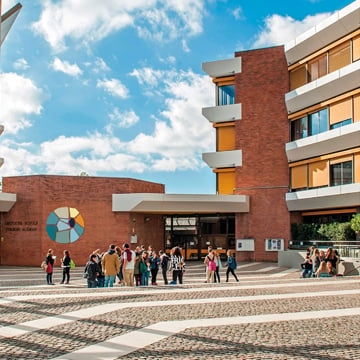 Colegio Hatikva: This school integrates Jewish educational traditions into its curriculum, emphasizing values and cultural heritage alongside academic instruction.
Colegio Hatikva: This school integrates Jewish educational traditions into its curriculum, emphasizing values and cultural heritage alongside academic instruction.